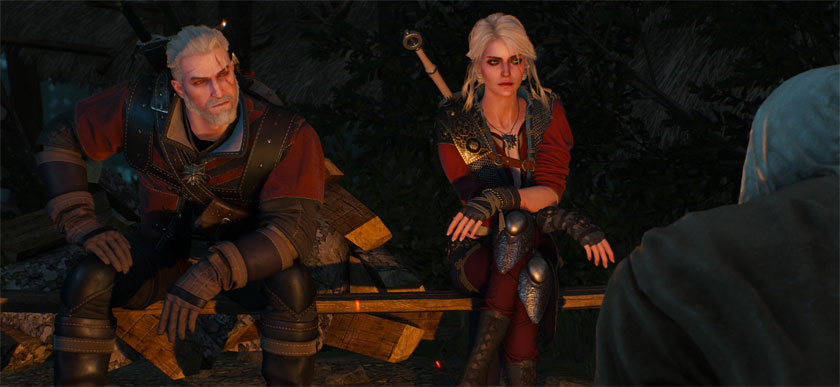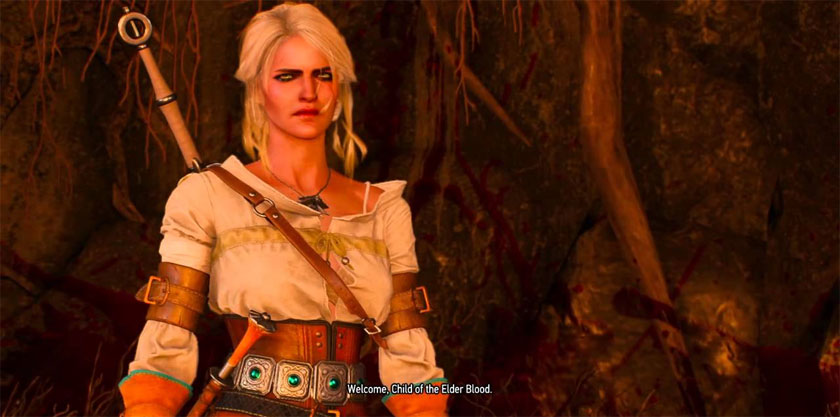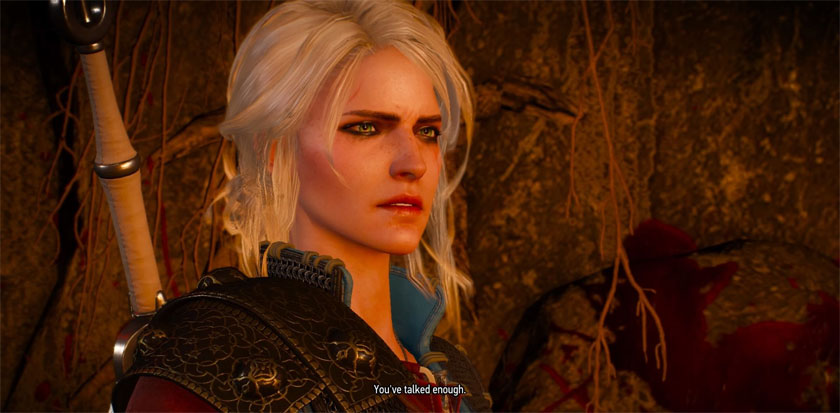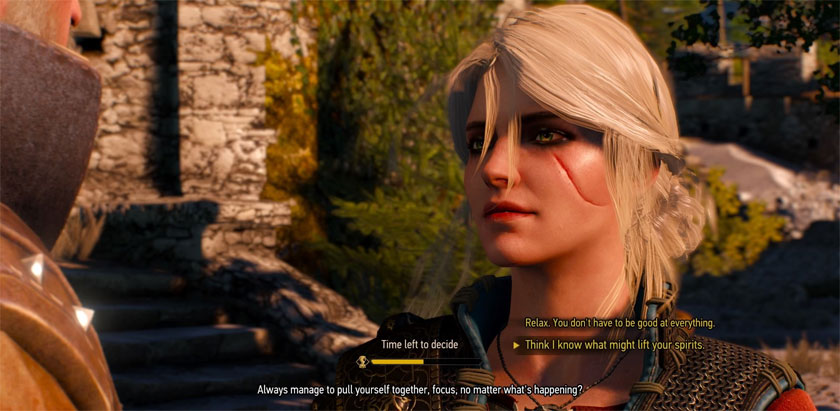Papa Geralt

It’s been almost eight years since I wrote The Walking Dad, my first essay for website GamersWithJobs and basis for my video analysis of Telltale’s The Walking Dead: Season One. I opened that essay with an illustration from my life, where I, as a full-grown adult, felt completely unprepared and out of my element. This moment of fear and embarrassment spoke to the thesis of Telltale’s first mainstream success: that protecting one’s child from adulthood will fail to prepare them for adulthood.
Without going into too much detail, the game’s conclusion was left perfectly ambiguous so as not to take away from the player’s choices throughout. They don’t “matter” in that the ending is the ending regardless of your decisions made throughout each episode. However, the player will be able to call back to earlier choices and conversations as the music swells during a highly emotional moment, only to leave the player wondering at the end if they had done enough. It was pitch perfect.
The Witcher 3 had, for a time, felt like the next best execution of this idea. Many of its dialogue choices seemed to ask me to consider Ciri’s personality rather than what was the canonically “correct” choice. I did my best to listen to Ciri and read her body language rather than go with my own instinct. Even if I believed one choice was “correct” in a pragmatic or ethical sense, I might have chosen a different one for the sake of Ciri’s emotions.
In the end, however, the nuance is lost as the game’s three endings suggest there was always a “correct” choice. This sort of reduction of meaning comes across as more insulting than the simplistic binary morality presented in BioShock 2. At least that game was obvious about its complete lack of sophistication towards “good” and “bad”. Even if The Witcher 3 does not profess to believe in a “right” or “wrong” resolution, one of these endings is far more sweet and uplifting than the other two. Even though the narrative up to this point were to suggest there is no “good” or “bad” in this universe, the mood and tone of each ending suggests a good – and therefore “correct” – ending, a bittersweet sort-of-good-but-not-really ending, and a blatantly bad ending.
The rest of this essay will be going into detail regarding the game’s narrative and conclusions, so reader beware if you’ve yet to play and complete the game yourself.

If you’re not familiar with The Witcher 3 and choose to read on anyway, then keep in mind that the first half of the game is a journey for Geralt’s adoptive daughter Ciri. From what I can gather, she was seventeen when the books ended, and therefore she’s about College-aged or so during the events of the game. She treats Geralt as her father, and he treats her as his daughter. She considers Kaer Morhen, the nearly-abandoned fortress that houses the Witchers, like a home. The other Witchers are perceived like Uncles, or, in the case of Vesemir, a grandfather. Even if this is not their biological relation, it is the emotional connection she has with each character.
Geralt finally reunites with Ciri halfway through the game. This is the first time they’ve seen each other in approximately four years by my estimation. Ciri has not only grown up a bit, but also gone off on her own adventures.
Unbeknownst to the player, the remainder of the story will continually provide them one of two choices throughout multiple conversations that will determine the ending. One choice will emphasize Ciri’s freedom to act independently of her own free will, or it will encourage Geralt to be protective and choose counsel. Or it may be the difference between acting according to one’s emotional impulse, or to remind her of how great her destiny is. In fact, there’s no real thematic consistency between each decision. It is, perhaps, why I believed the game to be more sophisticated than it is in execution.
After all, despite “dad games” becoming more of a trend in gaming over the past two decades, they’ve rarely approached what it’s like to be the parent of a young adult. The aforementioned BioShock 2 is the closest, where your daughter’s personality is determined by how ruthless or merciful you are. She has no response to your actions but to mimic them, rather than having an established personality from which to react to your decisions.
Ciri, on the other hand, already has an established personality of her own. Sometimes she’ll respond to Geralt’s statements or decisions with disapproval. Other times it’s not about approval or disapproval at all. She merely responds differently to Geralt’s statements or assistance. The discussions, as a result, feel more natural as opposed to being a video game mechanic.
To provide a more specific example, after a night wandering Novigrad with Ciri – meeting her friends and giving thanks to the efforts taken to help her out on her journey – she and Geralt discover the representatives of the Lodge of Sorceresses wish to speak with her. These sorceresses have a rather negative history with her, and represent one of the factions that has always insisted they know what’s best for Ciri. Before entering the room, her body language indicates a hint of fear. From her facial expression, the tone of her voice, the words spoken, and the manner in which she closes in on herself, she seems to be suggesting that she does not wish to face them alone.
If you choose to go in with her, you make the wrong choice. It is the wrong choice because you clearly do not trust her to make her own decisions, and therefore it impacts her confidence. Or perhaps the logic is that giving in to Ciri’s fear fails to help her overcome it. Little does the player know that they just pushed Ciri one step closer towards the “bad” ending, where her ultimate fate is unknown as she vanishes or dies trying to save the world.
The largest problem I have with this instance is not merely that Ciri was doing all but screaming “come in there with me”. It assumes that a parent’s presence at this point is always going to override the individual’s freedom. If the game were truly treating this situation with the sophistication its writing and reputation suggest, then it would acknowledge that even young adults could use the advice and guidance of their parents every so often. Geralt can be present and listen to the conversation while merely giving his thoughts to Ciri, should she ask for them. He doesn’t have to defend her, nor does he have to tell her what to do.

Perhaps I only have myself to blame. During the mission to Bald Mountain, where Geralt accompanies Ciri for her revenge against the Crones and the Wild Hunt’s Imlerith, I began to feel as if I was slowly guiding her through a mission. Keep calm when you speak to the locals. Gather information. Follow even their silly requests, such as diving into the lake for a coin. All of the steps that not only point to the monster, but perhaps reveal the little details your employers are hiding or themselves are unaware of.
It is possible that Geralt has already done such things with Ciri in the novels. I’ve never read the books, after all. I am unfamiliar with how much Witching she has performed, and her combat abilities are pretty strictly limited to teleportation. She uses no oils, no potions, and no decoctions. It is quite possible that she has learned enough combat fundamentals to survive risky encounters, but still has much to learn regarding the trade.
This is where I began to believe there was a sense of nuance to The Witcher 3 and its choices. Correct Ciri when you must, but do not invalidate her. Let her make decisions. Appeal to her personality. View her as an individual rather than the bearer of the Elder Blood. Traveling Novigrad with Ciri only seemed to affirm this suspicion, as I felt like a parent meeting all of his daughter’s friends she’d made at College while I was back home. Who were these people? Were they trustworthy? Were they a good influence? It had that feel to it, and therefore I chose to do my best to respond thusly. It was therefore with this thought in mind that I decided here, before the Lodge of Sorceresses, my presence would be a comfort, a support, and help confirm her own freedom of choice against a philosophical opponent.
It is possible that the writers fully intended there to be this sort of nuance in the narrative. That the player would indeed perceive these segments with just this sort of perspective. Yet the design team insisted there be three separate endings, and therefore the decisions must somehow lead to one of those conclusions. After all, having a snowball fight with Ciri isn’t necessarily a “good” choice versus Geralt sitting down to have a drink of alcohol with her. Each choice is perfectly valid, even though they have an indirect impact on Ciri’s mental state.
Of course, the actual text provided to the player for these choices is vague and indescriptive towards their end result. “Relax. You don’t have to be good at everything” does not communicate “Get drunk with me until you get depressed and doubt yourself”, nor does “I think I might know what will lift your spirits” communicate a snowball fight. It just so happens that getting drunk causes her to feel self-doubt, whereas the snowball fight clears the grumpiness from her mind so that she can continue practicing her magical teleportation tricks.

I am not criticizing the capabilities of the writing staff to pull these scenes off. Taken in isolation, they are all satisfying to experience. However, when you find out that it all boils down to certain scenes contributing towards an ending where Ciri survives as opposed to one that she dies or vanishes, it becomes clear that there’s a “good” and “bad” route. No matter how sophisticated the game presents itself to be, it is still a victim of simplified, binary choice for a good and bad end.
It makes me glad, then, that I chose three out of four of the good options given by the game. I’m also glad that I chose to skip Geralt and Ciri’s trip to the Emperor, which would have somehow led her to believe she ought to be Empress. It doesn’t matter if you filled her head with declarations of importance and responsibility due to her blood or emphasized her own freedom to choose. All that matters is you took her to the Emperor. If you did, then the game decides you need a bittersweet ending where the two part once more.
Perhaps there was a time where the endings were determined by far more nuanced choice. There are several times where Geralt can remind Ciri of the great things she can accomplish with her abilities, the burden they bear on her shoulders. Or he can emphasize her freedom to do as she pleases, that she is not bound by fate. Her choice to ascend the throne feels as if it is a result of the former, yet such dialogue choices have little to no bearing on the outcome. Perhaps, at one point, they had? Perhaps there were more endings planned, but due to time constraints they had to simplify the choices and stick with the three best or most complete endings?
Regardless, I’d have much rather CD Projekt Red had left Ciri’s fate decided – a single ending regardless of what choices you made – rather than in the hands of the player. Especially if the consequences of these choices would be so opaque. One of the least sophisticated paths a game can take is to suggest that there is a “right choice” and a “wrong choice”, particularly in a setting that rolls about in the greyness of morality like a pig in mud. The common assumption among players is that multiple endings reward agency, but what agency does a player have if there’s clearly a “best” option?
If nothing else, The Witcher 3 has taught me that there’s still an aspect of “parenting games” that has not been as explored as thoroughly as it could be: the role of a parent whose child has become an adult. Perhaps, one day, a talented developer will tackle such a topic without feeling bogged down by typical video game expectations as “good” and “bad” endings.


